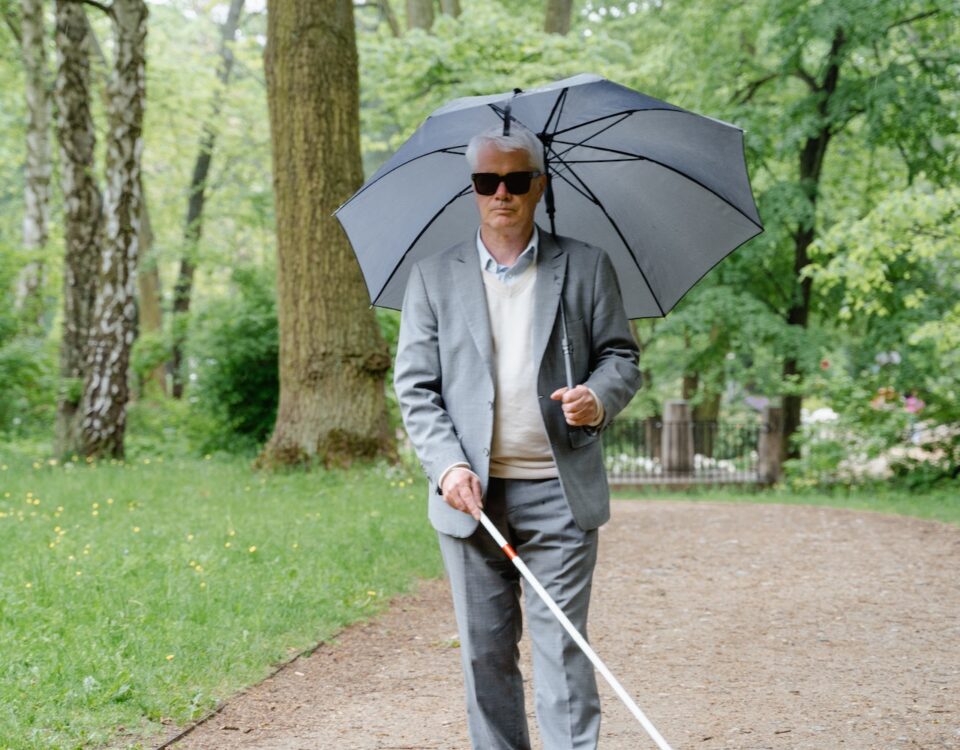You can’t always be there. But we can.
Tips for Managing Arthritis Pain in the Elderly

Companion Care for the Elderly
May 12, 2023
When an Elderly Loved One Has Lost their Vision
July 7, 2023Tips for Managing Arthritis Pain in the Elderly

Arthritis is a common condition affecting millions worldwide, with the elderly particularly susceptible. This chronic disease involves inflammation and degeneration of the joints, leading to pain, stiffness, and decreased mobility. Treating arthritis pain is crucial for maintaining the quality of life and physical and mental well-being.
In this article, we will discuss various strategies for managing arthritis pain in the elderly, including medical treatments, non-medical pain management techniques, lifestyle changes, assistive devices, and adaptive equipment, and how professional caregivers can support these efforts.
Understanding How to Treat Arthritis in the Elderly
There are several types of arthritis, with osteoarthritis and rheumatoid arthritis being the most common. Osteoarthritis is characterized by the gradual breakdown of cartilage in the joints, while rheumatoid arthritis involves inflammation of the joint lining.
A variety of factors, including inflammation, joint damage, and muscle strain, can cause arthritis pain. These changes in the body can significantly impact physical and mental health, making it essential to find effective methods for managing it.
Medical Treatments for Managing Arthritis
There are several medical treatments available for alleviating the pain of arthritis in the elderly:
- Over-the-counter pain relievers: Nonsteroidal anti-inflammatory drugs (NSAIDs) and acetaminophen can help reduce pain and inflammation. However, speak with your doctor before using due to potential side effects and interactions with other medications.
- Prescription medications: A physician may prescribe Corticosteroids for more severe cases of arthritis pain. These medications work by suppressing the immune system’s inflammatory response.
- Topical treatments: Creams and gels containing NSAIDs or capsaicin can be applied directly to affected joints for localized pain relief.
Before starting any new medication or treatment plan, talk with a healthcare professional, such as your doctor or local pharmacist.
Non-Medical Techniques for Managing Arthritis Pain

Several non-medical techniques can help reduce the physical discomfort of arthritis in the elderly:
- Physical therapy and exercise: A physical therapist can develop a personalized exercise plan to improve joint mobility, strength, and flexibility. These exercises can improve a person’s range of motion, strength, and aerobic capacity. Regular exercises like walking, swimming, or cycling can help alleviate arthritis pain by reducing joint stiffness and inflammation.
- Heat and cold therapy: Applying heat to painful joints can help relieve stiffness and muscle spasms, while cold therapy can reduce inflammation and swelling. Alternating between heat and cold treatments can provide optimal pain relief.
- Massage therapy: Massage can help relax muscles, improve circulation, and reduce pain in arthritic joints. Various types of massages can help with managing arthritis pain, including Swedish and deep tissue massage.
Lifestyle Changes for Arthritis Pain Management
Making specific lifestyle changes can also aid in reducing the physical symptoms of arthritis in the elderly:
- Weight management: Adopting a healthy diet and a regular exercise schedule can help promote weight loss and reduce joint strain.
- Stress management: Stress can worsen arthritis symptoms by triggering inflammation. Meditation, deep breathing exercises, and yoga can help reduce stress levels.
- Sleep hygiene: Adequate sleep is essential for pain management, as it allows the body to heal and recover. Establishing a regular sleep routine can improve sleep quality.
Assistive Devices and Adaptive Equipment for Managing Arthritis
Using assistive devices and adaptive equipment can make daily tasks more manageable and less painful for individuals with arthritis. These tools can improve independence, reduce strain on affected joints, and promote overall quality of life.
- Types of assistive devices: Canes, walkers, and braces can provide support and stability while walking or performing other activities.
- Types of adaptive equipment for home modifications: Installing grab bars, raised toilet seats, and other adaptations can make the home environment safer and more comfortable.
Having Trouble Managing Arthritis? Professional Caregivers Can Help.
The lifestyle limitations resulting from arthritis in the elderly can put significant pressure on adult children. Working with an in-home professional caregiver can help your parents accomplish their daily activities while supporting medication compliance and lifestyle changes that can help reduce arthritis pain.
Caring for a loved one with osteoarthritis or rheumatoid arthritis can be challenging, but helping your aging parent maintain their independence and dignity is its own special reward. When you need additional support to care for your parents, contact 1Heart Caregivers. A comprehensive listing of our senior care services is available on our website.

